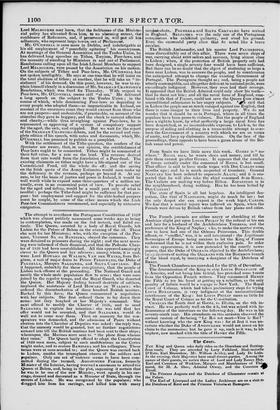The attempt to overthrow the Portuguese Constitution of 1820 which
was almost publicly announced some weeks ago as being in contemplation, was made on the 3rd instant, and failed en- tirely. The Queen, escorted by a body of Rce al Guards, left Lisbon for the Palace of Belem on the evening of the 3d. There she sent for her Ministers; who, with the exception of the Pre- mier, Viscount SA DA BANDIERA, obeyed the summons. They were detained as prisoners during the night ; and the next morn- ing were informed of their dismissal, and that the Pedroite Char- ter of 1826 had been reestablished. All this appeared amazingly clever to the Queen and her advisers ; among whom, it is said, were Lord HOWARD DE WALDEN, VAN DER WEYER, from Bel- gium, a sort of major domo to Prince FERDINAND, the Duke of PALMELLA, Marquis SALDANHA, and SILVA CARVALHO. But it happened, unluckily for these conepirators, that the people of Lisbon took offence at the proceeding. The National Guard and nearly the whole male population flew to arms ; they were soon joined by the regular troops, and the Royal Guard, who deserted the Queen. Her Majesty finding herself destitute of soldiers, implored the assistance of Lord HOWARD Di WALDEN; Who ordered the disembarkation of three hundred British marines. Backed by this force, the Queen commenced a negotiation with her subjects. She first ordered them to lay down their arms: but they laughed at her Majesty's command. She next offered to modify the Charter of 1826, and to send SALDANHA to explain her intention : she was told that her offer would not be accepted, and that SALDANHA would do well not to come near them. Then an amnesty for the con- spirators was demanded, and the admission of Peers without election into the Chamber of Deputies was asked : the reply was, that the amnesty would be granted, but no further negotiations entered into till the British marines had been sent to their ships; whereupon the Marines were sent to " the place from whence they came." The Queen lastly offered to adopt the Constitution of 1820 once more, subject to such modifications as the Cortes might make, and to restore BANDIERA and his colleagues. These terms were at once acceded to; and the Queen was carried back to Lisbon, amidst the triumphant cheers of the soldiers and populace. Only one act orviolence seems to have been com- mitted during the turmoil. AGOSTINTHO FREIRE, formerly Miuister of the Interior, having received a summons to attend the Queen at Belem, and, being in the plot, supposing it certain that be waa to be one of the new Ministrs , went openly in his car- riage, dressed and decorated as a Minister of State, through the streets of Lisbon. He was recognized by the populace; who dragged him from his carriage, and killed him with many
musk-shots.. PALMELLA and SILVA CARVALHO have arrived in England. SALD.ANHA was the only one of the Portuguese conspirators who exhibited gallantry, and stood his ground. Even the suceessful party allow that he acted like a brave cavalier.
The British Ambassador, and his master Lord PALMERSTON, come discreditably out of this affair. There were seven ships of war, carrying about 4000 sailors and marines, lying almost close to Lisbon ; when, if the protection of British property only had been designed, a single seventy, four would have been sufficient. But there can be no doubt that the object of stationing so large a force near Lisbon, was to overawe the people, and to countenance the anticipated attempt to change the existing Government of Portugal. The Portuguese thought so; and, being a people not utterly contemptible, not altogether deficient in national pride, were exceedingly indignant. However, they soon had their revenge. It appeared that the British Admiral could only show his teeth— that he durst not bite; and all the naval force of England, com- bined with that of France, could!not save the Queen trom almost unconditional submission to her angry subjects. TO% said that in Lisbon the people are so much enraged against tee English, that there is some danger to their lives and property. We do not wonder that it should be so in Portugal, where in all times the populace have been prone to violence. But the people of England have a right to know, by what authority a large naval force has been despatched, at no inconsiderable expense, to Lisbon, for the purpose of aiding and abetting in a treasonable attempt to over- turn the Got ernment of a country with which we are on terms of amity, and keep up diplomatic relations. On the face of the proceedings, there appears to have been a gross abuse of the Bri- tish name and power.


























 Previous page
Previous page